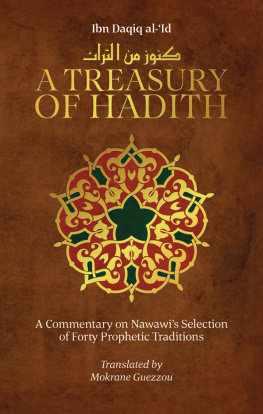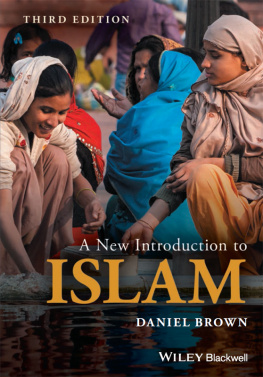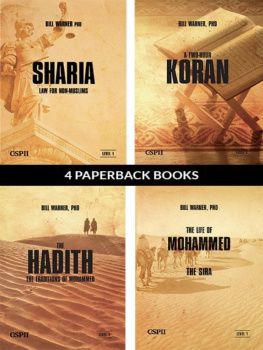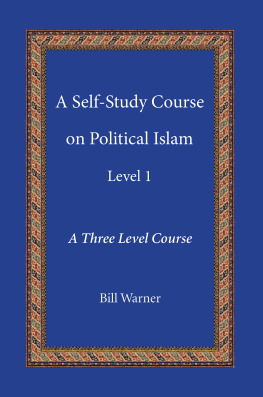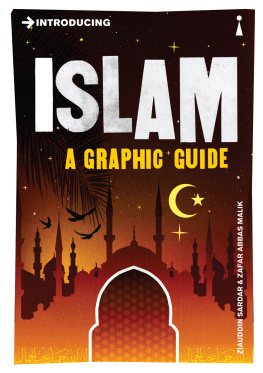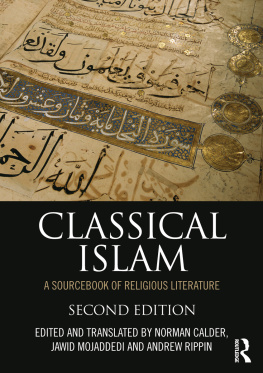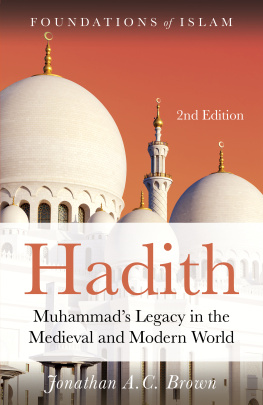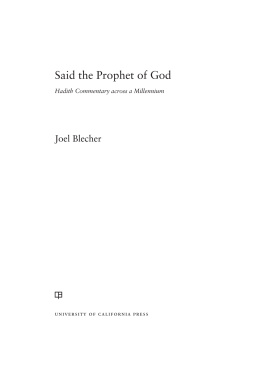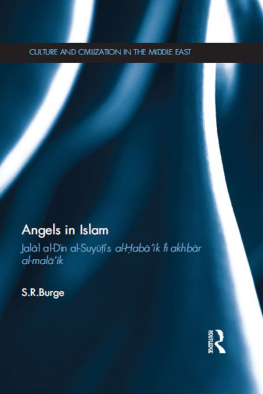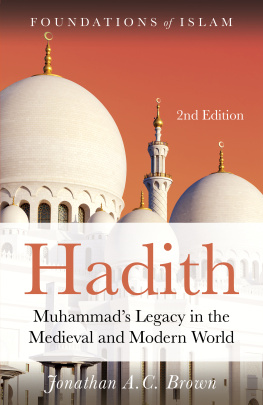A TREASURY OF HADITH
THE TREASURY SERIES IN
ISLAMIC THOUGHT AND CIVILIZATION
i.A Treasury of Hadith, Ibn Daqiq al-Id
ii.A Treasury of Ghazali, Mustafa Abu Sway (forthcoming)
iii.A Treasury of Ibn Taymiyyah, Mustapha Sheikh (forthcoming)
Ibn Daqiq al-Id

A TREASURY OF HADITH

A Commentary on Nawawis
Forty Prophetic Traditions

Translated by
Mokrane Guezzou

A Treasury of adth
A Commentary on
Nawaws Forty Prophetic Traditions
First published in England by
Kube Publishing Ltd
Markfield Conference Centre
Ratby Lane, Markfield
Leicestershire LE67 9sy
United Kingdom
TEL +44 (0)1530 249230
FAX +44 (0)1530 249656
WEBSITE www.kubepublishing.com
EMAIL
Mokrane Guezzou, 2014
All rights reserved.
The right of Mokrane Guezzou to be identified as
the author of this work has been asserted by him
in accordance with the Copyright, Designs and
Patents Act, 1988.
CIP data for this book is available from the British Library.
ISBN 978-1-84774-067-0 casebound
ISBN 978-1-84774-069-4 ebook
Editors Yahya Birt and Dr Abdullah Sahin
Cover design Inspiral Design
Book design & typesetting Imtiaze Ahmed
Arabic typesetting Naiem Qaddoura
Printed by Imak Offset, Istanbul, Turkey
Contents




In the Name of Allah, Most Merciful and Compassionate

P RAISE BE TO God, Lord of the Worlds, the Sustainer of the heavens and earths, the Disposer of all created beings, the Sender of Messengers, may Gods blessing and peace be upon them, to those who are legally responsible, so as to guide them and elucidate [to them] the ordinances of the religion with conclusive proofs and clear evidences. I praise Him for all His blessings, and ask Him for more of His favour and generosity.
I also bear witness that there is no deity but God, the One, the All-Compelling, the Generous and the Oft-Forgiving. And I bear witness that Muhammad is His servant and messenger, beloved and intimate friend, the best of all created beings, who was honoured with the noble Qurn the continuous miracle throughout the years and with clear ways for those seeking guidance; and who was further singled out to have the most comprehensive speech and tolerance of religion. And may Gods blessings and peace be upon him and upon all the prophets, their households and upon all the righteous among people.
To proceed: we have narrated from Al ibn Ab lib, Abd Allh ibn Masd, Mudh ibn Jabal, Abl-Dard, Ibn Umar, Ibn Abbs, Anas ibn Mlik, Ab Hurayrah and Ab Sad al-Khudr, may God be pleased with them, from many chains of transmission and in variegated versions that Gods Messenger, may Gods blessings and peace be upon him, said: Whosoever preserves for my Community forty adth relating to matters of its religion, God will resurrect him on Judgement Day with the scholars of Sacred Law and the scholars of sacred knowledge, and, in another version, God will resurrect him as a scholar of Sacred Law and sacred knowledge. The version of Abl-Dard has and I shall be a witness and intercessor for him on Judgement Day; and, in the version of Ibn Masd, he shall be told: enter from any of the gates of Paradise you wish to enter; and, in the version of Ibn Umar, he shall be recorded amongst the group of scholars of sacred knowledge and assembled amongst the martyrs. adith masters are in agreement that this adth is weak even though its chains of transmission are diverse.
Scholars, may God be pleased with them, have authored countless books in this field. The first I in this field is Abd Allh ibn al-Mubrak, then Muammad ibn Aslam al-s, the pious scholar, then al-asan ibn Sufyn al-Nasaw, Ab Bakr al-jr, Abu Bakr Muammad ibn Ibrhm al-Afahn, al-Draqun, al-kim, Ab Nuaym [al-Afahn], Ab Abd al-Ramn al-Sulam, Abu Sad al-Mln, Ab Uthman al-bn, Abd Allh ibn Muammad al-Anr, Ab Bakr al-Bay-haq, and countless other people from the first and later generations of Muslims. Hence, I have sought Gods guidance to gather forty prophetic sayings in emulation of these eminent masters and preservers of Islam.
The scholars of sacred knowledge are in agreement about the permissibility of using weak prophetic traditions as evidence for performing works of virtue. Nonetheless, my reliance is not on this above-mentioned tradition. I am rather relying on his saying, may Gods blessings and peace be upon him, in rigorously-authenticated adth: let those present among you inform those who are absent, and on his saying, may Gods blessings and peace be upon him, God bestows beauty and light on the person who hears my speech, remembers it and then passes it on as he has heard it.
Furthermore, there are among the scholars of sacred knowledge those who have gathered forty adth relating to tenets of faith, while others chose particular questions of Sacred Law, or jihad, or non-attachment, or good conduct, or the sermons of the Prophet, may Gods blessings and peace be upon him all of which are noble aims, may God be pleased with those who sought to compile them.
I have decided to compile forty adth that are more important than all these aims and which further comprise all of them. Each adth is a great rule of the religion, described by scholars of sacred knowledge as an axis of Islam, or that it is half of Islam or its third, or something similar. In these forty adth, I confine myself to those rigorously authenticated, most of which are in the rigorously-authenticated collections of Bukhr and Muslim. I shall mention them without their chains of transmission so as to facilitate their memorization and widen their benefit, God willing, and then I shall follow them by a chapter in which I explain difficult words.
Anyone desiring the Afterlife ought to know these adth in view of what they contain of important matters and of reminder of all acts of obedience; this is obvious to anyone who has bothered to think. My reliance is on God, I seek refuge in Him and to Him I consign my affairs. Praise and blessing are His, and through Him is success and protection from sin.



